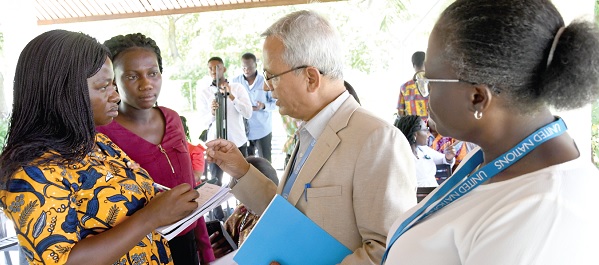
Govt urged to up investment in WASH
Government has been called upon to increase investment in the water, sanitation and hygiene (WASH) sector, and create an enabling environment for private sector and users to invest in sustainable water and sanitation services.
Advertisement
The Chief in-charge of WASH at the United Nations Children's Fund (UNICEF), Ramesh Bhusal, said the current public sector investment into WASH, estimated to be around $100 million per year, was “only a fraction of what is needed to achieve the Sustainable Development Goal (SDG) Six targets by 2030”, and urged the government to prioritise the WASH sector.
Mr Bhusal was speaking at a press briefing organised by United Nations (UN) Ghana to present the current WASH achievements, challenges and efforts made to Ghana to support efforts towards the attainment of the SDG Six ahead of the UN 2023 Water Conference and Water Day celebration co-hosted by Tajikistan and the Netherlands.
This year’s World Water Day, christened: “Accelerating change to solve the water and sanitation crisis”, highlights the need to take individual actions to accelerate change through partnerships and cooperation.
Poor sanitation
Mr Bhusal said “access to water and sanitation are human rights and the building blocks for sustainable growth of any society”, and that for Ghana’s balanced growth, the country needed to accelerate access to safely managed water and sanitation.
He commended Ghana for ensuring 88 per cent access to basic water service, nearly the global average of 90 per cent, with some 42 per cent accessing safely managed water, which is below the global average of 74 per cent but higher than the sub-Saharan average of 30 per cent.
He, however, expressed concern that the sanitation situation in Ghana was very poor, with only 25 per cent having access to basic sanitation services, about 57 per cent using shared or public toilet facilities, and 18 per cent defecating in the open.
“Poor sanitation conditions pose serious public health risks.
In Ghana, according to World Health Organisation (WHO), 7,653 deaths were caused by WASH-related illnesses in 2019, and almost one person every hour dying from preventable WASH-related diseases,” he said.
He said the WASH situation in the northern parts of Ghana was much worse compared to the national average.
Effective systems
The Deputy Director of the Centre for Scientific and Industrial Research, Water Research Institute (CSIR-WRI), Dr Anthony Yaw Karikari, indicated that the lack of enforcement and implementation of policies and legislative frameworks in the water sector was negatively affecting the effective management of water resources in Ghana.
He said although Ghana had made some strides in the water sector by establishing institutions with supportive policies and legislative frameworks, “implementation and enforcement appears to be challenging”.
Dr Karikari stated that Ghana was water-stressed, and the proportion of people living in water scarcity and stressed areas was growing.
“With the increase in human activities around rivers such as illegal mining, water sources are becoming polluted and cannot be used for drinking and other purposes without treatment.
Quality of our water bodies are declining, and if nothing is done by stakeholders, we will have to ration water in the near future,” he said.




